English LiteratureII英国文学
英国文学用英语怎么说
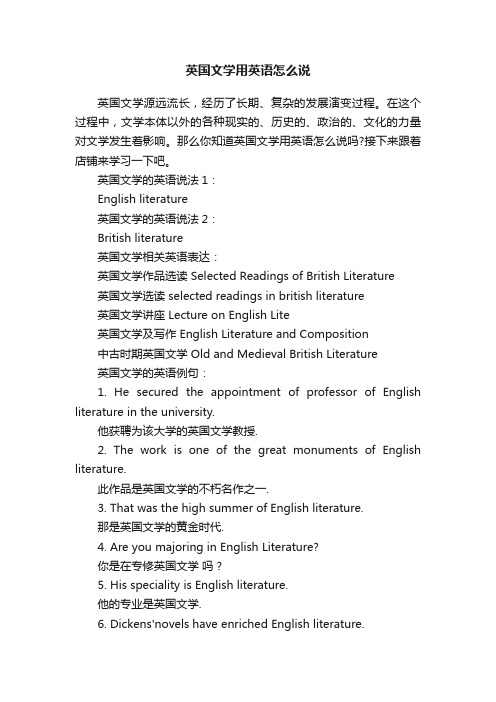
英国文学用英语怎么说英国文学源远流长,经历了长期、复杂的发展演变过程。
在这个过程中,文学本体以外的各种现实的、历史的、政治的、文化的力量对文学发生着影响。
那么你知道英国文学用英语怎么说吗?接下来跟着店铺来学习一下吧。
英国文学的英语说法1:English literature英国文学的英语说法2:British literature英国文学相关英语表达:英国文学作品选读 Selected Readings of British Literature英国文学选读 selected readings in british literature英国文学讲座 Lecture on English Lite英国文学及写作 English Literature and Composition中古时期英国文学 Old and Medieval British Literature英国文学的英语例句:1. He secured the appointment of professor of English literature in the university.他获聘为该大学的英国文学教授.2. The work is one of the great monuments of English literature.此作品是英国文学的不朽名作之一.3. That was the high summer of English literature.那是英国文学的黄金时代.4. Are you majoring in English Literature?你是在专修英国文学吗 ?5. His speciality is English literature.他的专业是英国文学.6. Dickens'novels have enriched English literature.狄更斯的小说丰富了英国文学.7. He has a formidable knowledge of English literature.他有丰富的英国文学知识.8. His specialty is English literature.他的专业是英国文学。
(完整word版)英国文学史及选读
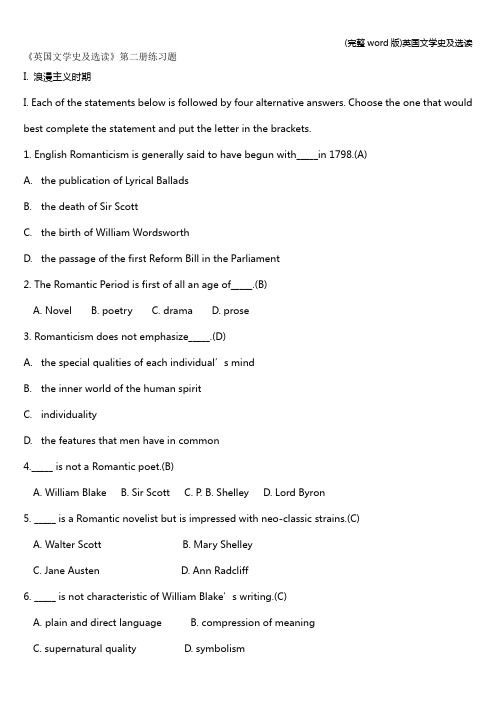
《英国文学史及选读》第二册练习题I. 浪漫主义时期I. Each of the statements below is followed by four alternative answers. Choose the one that would best complete the statement and put the letter in the brackets.1. English Romanticism is generally said to have begun with_____in 1798.(A)A. the publication of Lyrical BalladsB. the death of Sir ScottC. the birth of William WordsworthD. the passage of the first Reform Bill in the Parliament2. The Romantic Period is first of all an age of_____.(B)A. NovelB. poetryC. dramaD. prose3. Romanticism does not emphasize_____.(D)A. the special qualities of each individual’s mindB. the inner world of the human spiritC. individualityD. the features that men have in common4._____ is not a Romantic poet.(B)A. William BlakeB. Sir ScottC. P. B. ShelleyD. Lord Byron5. _____ is a Romantic novelist but is impressed with neo-classic strains.(C)A. Walter ScottB. Mary ShelleyC. Jane AustenD. Ann Radcliff6. _____ is not characte ristic of William Blake’s writing.(C)A. plain and direct languageB. compression of meaningC. supernatural qualityD. symbolism7. Wordsworth published Lyrical Ballads in 1789 with _____.(B)A. ByronB. ColeridgeC. ShelleyD. Keats8. Wordsworth thinks that _____ is the only subject of literary interest.(D)A. the life of rising bourgeoisieB. aristocratic lifeC. the life of the royal familyD. common life9. Don Juan is the masterpiece of_____.(A)A. Lord Byron’sB. P. B. Shelley’sC. John Keats’sD. Samuel Coleridge’s10. _____ is not a novel written by Jane Austen.(A)A. Jane EyreB. Sense and SensibilityC. Pride and PrejudiceD. EmmaII.维多利亚时期I. Each of the statement below is followed by four alternative answers. Choose the one that would best complete the statement and put the letter in the brackets1. The Victorian period roughly began at the enthronement of Queen Victoria in_____.(B)A. 1835B. 1836C. 1837D. 18382. The critical realists like Charles Dickens in the Victorian period wrote novels_____.(D)A. representing the 18th century realist novelB. criticizing the societyC. defending the massE. all the above3. _____is not a Victoria novelist.(D)A. Charles DickensB. George EliotC. William Makepeace ThackerayD. D. H. Lawrence4. _____ is not a work by Charles Dickens.(C)A. Oliver TwistB. David CopperfieldC. MiddlemarchD. A Tale of Two Cities5. Wuthering Heights is a masterpiece written by_____.(B)A. Charlotte BronteB. Emily BronteC. Anne BronteD. Branwell Bronte6. _____ is not Thomas Hardy’s work.(A)A. The Mill on the FlossB. Tess of the D’UrbervillesC. Jude the ObscureD. The Mayor of Casterbridge7. “My Last Duchess” is _____.(A)A. a dramatic monologueB. a short lyricC. a novelD. an essay8. Tennyson’s “Ulysses” gets its inspiration from the following works or writers except_____.(B)A. Homer’s OdesseyB. Joyce’s UlyssesC. DanteD. Greek Mythology9. In the 19th century English literature, a new literary trend _____ appeared. And it flourished in the 1840s and in the early 1950s.(D)A. romanticismB. naturalismC. realismD. critical realism10. The title of the novel Vanity Fair was taken from_____.(A)A. The Pilgrim’s ProgressB. Childe Harold’s PilgrimageC. Gulliver’s TravelsD. The Canterbury TalesIV. Name the author of each of the following literary works.1. The Posthumous Papers of the Pickwick Club (Charles Dickens)2. The Tenant of Wildfell Hall (Anne Bronte)3. In Memoriam (Alfred Tennyson)4. The Mill on the Floss (George Eliot)5. The Return of the Native (Thomas Hardy)VI. For each of the quotations listed below please give the name of the author and the title of the literary work from which it is taken and then briefly interpret it.1. That same evening the gentleman in the white waistcoat most positively and decidedly affirmed, not only that Oliver would be hung, but that he would be drawn and quartered into the bargain. Mr. Bumble shoot his head with gloomy mystery, and said he wished he might come to good; where—unto Mr. Gamfield replied, that he wished he might come to him---which, although he agreed with the beadle in most matters, would seem to be a wish of a totally opposite description. The next morning, the public were once more informed that Oliver Twist was again To Let, and that five pounds would be paid to anybody who would take possession of him.( It is taken from Charles Dickens’s Oliver Twist. This part describes how Oliver is punished for asking for more to eat and how he is therefore sold at three pound ten to a notorious chimney-sweeper. It reveals that the pitiable state of the orphan boy and the cruelty and hypocrisy of theworkhouse board.)2. Thus, neither having the clue to the other’s secret, they were respectively puzzled at what each revealed, and awaited new knowledge of each other’s character and moods without attempting to pry into each o ther’s history.Every day, every hour, brought to him one more little stroke of her nature, and to her one more of his. Tess was trying to lead a repressed life, but she little divined the strength of her own vitality.( It is taken from Thomas Hardy’s Tess of the D’Urbervilles. This part describes how Tess forgets about her past misfortune in the beautiful, pastoral dairy farm and unconsciously gives herself up to the attraction of Angel Clare.)III. 现代时期I. Each of the statement below is followed by four alternative answers. Choose the one that would best complete the statement and put the letter in the brackets1. Modernism takes_____as its theoretical base.(C)A. the irrational philosophyB. the theory of psycho-analysisC. both A and BD. neither A nor B2. Modernism rose out of_____.(D)A. skepticismB. disillusion of capitalismC. irrational philosophyD. al the above3. Modernism is, in many aspects, a reaction against_____.(B)A .romanticism B. realismC. post-modernismD. all the above4. _____is not a movement in the modern period.(C)A. “the Angry Young Men”B. “the Beat Generation”C. “the Lost Generation”D. “the Theater of the Absurd”5. _____ is not a representative figure i n applying the technique of “the stream of consciousness” in his/her writing.(A)A. D. H. LawrenceB. James JoyceC. Virginia WoolfD. Dorothy Richardson6. Waiting for Godot is regarded as the most famous and influential play of the Theater of Absurd. It is written by_____.(B)A. George Bernard ShawB. Samuel BeckettC. John GalsworthyD. Eugene O’ Neill7. The Waste Land is_____’s most important single poem.(D)A. Ezra PoundB. William Butler YeatsC. Alfred TennysonD. T. S. Eliot8. _____ is not D. H. Lawrence’s work.(A)A. Finnegans WakeB. Sons and LoversC. Lady Chatterley’s LoverD. The Rain Bow9. _____ is not James Joyce’s novel.(C)A. UlyssesB. A Portrait of the Artist as a Young ManC. DublinersD. Finnegans Wake10. “The Love Song of J. Alfred Prufrock” is written by_____.(D)A. W. H. AudenB. D. H. LawrenceC. W. B. YeatsD. T. S. EliotIV. Name the author of each of the following literary works.1. Pygmalion (Bernard Shaw )2. “Sailing to Byzantium” (W. B. Yeats)3. Woman in Love (D. H. Lawrence)4. Ulysses (James Joyce)5. The Man of Property (John Galsworthy)VI. For each of the quotations listed below please give the name of the author and the title of the literary work from which it is taken and then briefly interpret it.1. I will arise and go now, for always night and dayI hear lake water lapping with low sounds by the shore;While I stand on the roadway, or on the pavements gray,I hear it in the deep heart’s core.(It is taken from Yeats’s “The lake Isle of Innisfree.” In this poem, Yeats expresses his longing to escape from the city life and to live a secluded life by describing the peaceful, tranquil scene of the lake Isle of Innisfree, a legendary place for hermitage.)2. Now she began to combat in his restless fretting. He still kept up his connexion with Miriam, could neither break free nor go the whole length of engagement. And this indecision seemed to bleed him of his energy. Moreover. His mother suspected him of an unrecognized leaning towards Clara, and, since the latter was a married woman, she wished he would fall in love with one of the girls in a better station of life. But he was stupid, and would refuse to love or even to admire a girl much, just because she was his social superior.(It is taken from D. H. Lawrence’s Sons and Lovers. Paul has love affairs with two girls, Miriam and Clara. But he is so dependent on his mother’s love and help that he fails to achieve a fulfilling relationship with either girl.) English Literature ( Book II)2.William Wordsworth要知道他的“Lyrical Ballads”前言是英国浪漫主义时期开始的标志,也是宣言。
英国文学与美国文学学习笔记摘抄
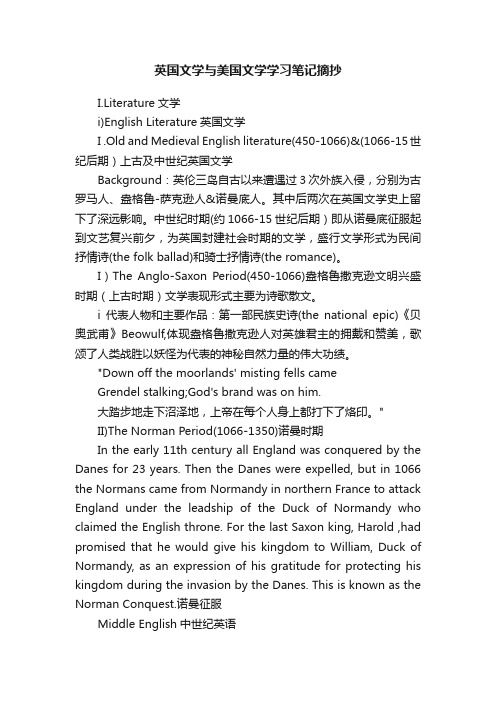
英国文学与美国文学学习笔记摘抄I.Literature文学i)English Literature英国文学I .Old and Medieval English literature(450-1066)&(1066-15世纪后期)上古及中世纪英国文学Background:英伦三岛自古以来遭遇过3次外族入侵,分别为古罗马人、盎格鲁-萨克逊人&诺曼底人。
其中后两次在英国文学史上留下了深远影响。
中世纪时期(约1066-15世纪后期)即从诺曼底征服起到文艺复兴前夕,为英国封建社会时期的文学,盛行文学形式为民间抒情诗(the folk ballad)和骑士抒情诗(the romance)。
I)The Anglo-Saxon Period(450-1066)盎格鲁撒克逊文明兴盛时期(上古时期)文学表现形式主要为诗歌散文。
i代表人物和主要作品:第一部民族史诗(the national epic)《贝奥武甫》Beowulf,体现盎格鲁撒克逊人对英雄君主的拥戴和赞美,歌颂了人类战胜以妖怪为代表的神秘自然力量的伟大功绩。
"Down off the moorlands' misting fells cameGrendel stalking;God's brand was on him.大踏步地走下沼泽地,上帝在每个人身上都打下了烙印。
"II)The Norman Period(1066-1350)诺曼时期In the early 11th century all England was conquered by the Danes for 23 years. Then the Danes were expelled, but in 1066 the Normans came from Normandy in northern France to attack England under the leadship of the Duck of Normandy who claimed the English throne. For the last Saxon king, Harold ,had promised that he would give his kingdom to William, Duck of Normandy, as an expression of his gratitude for protecting his kingdom during the invasion by the Danes. This is known as the Norman Conquest.诺曼征服Middle English中世纪英语III)The Age of chaucer(1350-1400)乔叟时期The Hundred Years' War英法百年战争Geoffrey Chaucer杰弗里.乔叟-中世纪最伟大诗人、英国民族文学奠基者。
英美文学作家及作品
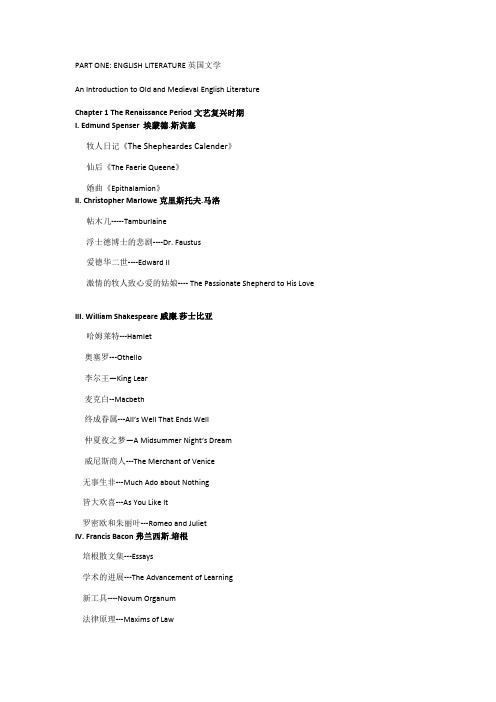
PART ONE: ENGLISH LITERATURE 英国文学An Introduction to Old and Medieval English LiteratureChapter 1 The Renaissance Period 文艺复兴时期I. Edmund Spenser 埃蒙德.斯宾塞牧人日记《The Shepheardes Calender》仙后《The Faerie Queene》婚曲《Epithalamion》II. Christopher Marlowe 克里斯托夫.马洛帖木儿-----Tamburlaine浮士德博士的悲剧----Dr. Faustus爱德华二世----Edward II激情的牧人致心爱的姑娘---- The Passionate Shepherd to His LoveIII. William Shakespeare 威廉.莎士比亚哈姆莱特---Hamlet奥塞罗---Othello李尔王—King Lear麦克白--Macbeth终成眷属---All’s Well That Ends Well仲夏夜之梦—A Midsummer Night’s Dream威尼斯商人---The Merchant of Venice无事生非---Much Ado about Nothing皆大欢喜---As You Like It罗密欧和朱丽叶---Romeo and JulietIV. Francis Bacon 弗兰西斯.培根培根散文集---Essays学术的进展---The Advancement of Learning新工具----Novum Organum法律原理---Maxims of Law—论学习---Of StudiesV. John Donne 约翰.邓恩挽歌与讽刺----The Elegies and Satires歌与十四行诗---The Songs and Sonnets告别爱情----Farewell to Love圣十四行诗---Holly Sonnets圣父赞美诗----A Hymn to God the Father日出---The Sun Rising死亡,你别骄傲---Death, Be Not ProudVI. John Milton 约翰.弥尔顿失乐园---Paradise Lost复乐园---Paradise Regained力士参孙----Samson AgonistesChapter 2 The Neoclassical Period 新古典主义时期I. John Bunyan 约翰.班扬天路历程---The Pilgrim’s Progress罪人头目的赦免---Grace Abounding to the Chiel of Sinners拜得门先生生死录—The Life and Death of Mr. Badman圣战----The Holy WarII. Alexander Pope 亚历山大.蒲伯论批评---An Essay on Criticism夺发记---The Rape of the Lock群愚史诗---The Dunciad人伦---An Essay on Man译有荷马史诗《伊利亚特》、《奥德塞》III. Daniel Defoe 丹尼尔.笛福鲁滨逊漂流记----Robinson Crusoe辛利顿船长----Captain Singleton莫尔.弗朗德斯-----Moll Flanders杰克上校----Colonel Jack— <成为异教徒的捷径>---The Shortest Way with the Dissenters(1702) 让他身陷囹圄《地地道道的英国人》-The True-Born Englishman使他成为英王的好朋友。
英国文学2 The Old English Period and the Middle English Period
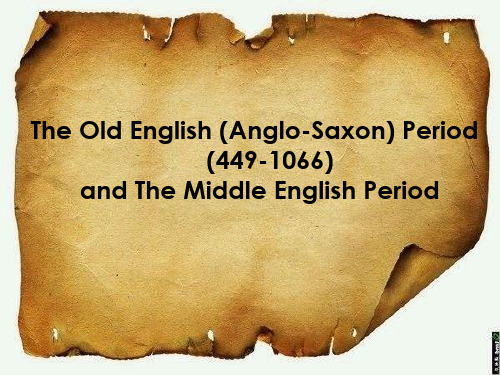
Writing Features of the Poem: 1) It is not a Christian but a pagan poem. The whole poem presents us an all-round picture of the tribal society and Christian culture. 2) The use of the strong stress and the predominance of consonants are very notable in this poem. Each line is divided into two halves, and each half has two heavy stresses. 3) The use of the alliteration is another notable feature. Three stresses of the whole line are made even more emphatic by the use of alliteration. 4) A lot of metaphors and understatements are used in the poem. For example, the sea is called "the whale-road" or "the swan road"; the soldiers are called "shield-men"; the chieftains are called the "treasure keepers"; human-body is referred to as "the bone- house”; God is called "wonder-wielder”; monster is referred to as "souldestroyer".
外研社英美文学简史及名篇选读教学课件英国文学u2
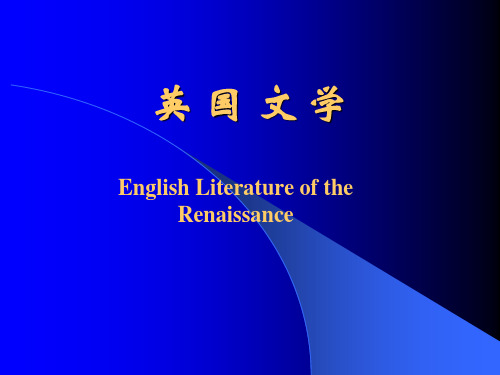
A nine-line stanza consisting of eight lines of iambic pentameter and a concluding line of iambic hexameter, rhyming ABABBCBCC , named after English poet Edmund Spenser.
Other definition:
During the 14th and 16th centuries an intellectual movement known as the Renaissance swept Europe. It was characterized by admiration of the Greek and Latin classic works. The sonnet and other Italian literary influences began to appear in English literature. (谢福之,2013:67)
2. Plot and theme of The Faerie Queene :
--12 books were to describe the 12 adventures (only finished 6). Each knight represents a virtue, as Holiness, Chastity, Friendship, Justice and Courtesy. It is written in a 9-line stanza form, named Spenserian Stanza.
(3) His works paved the way for the plays of the greatest English dramatist,Shakespeare.
Syllabus (研究型)
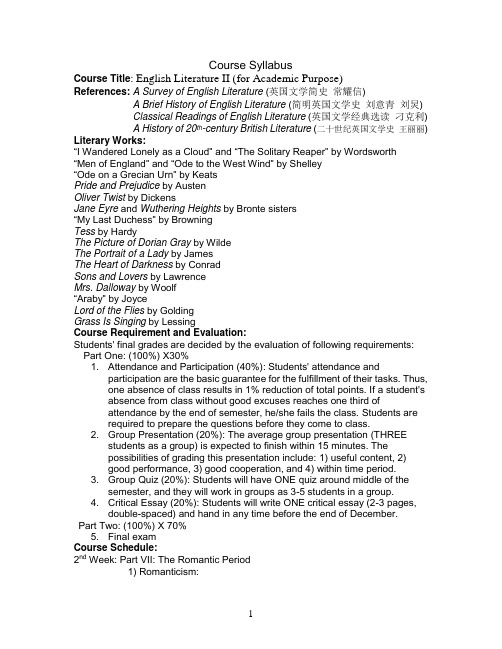
Course SyllabusCourse Title: English Literature II (for Academic Purpose)References: A Survey of English Literature (英国文学简史常耀信)A Brief History of English Literature (简明英国文学史刘意青刘炅)Classical Readings of English Literature (英国文学经典选读刁克利)A History of 20th-century British Literature (二十世纪英国文学史王丽丽) Literary Works:“I Wandered Lonely as a Cloud” and “The Solitary Reaper” by Wordsworth “Men of England” and “Ode to the West Wind” by Shelley“Ode on a Grecian Urn” by KeatsPride and Prejudice by AustenOliver Twist by DickensJane Eyre and Wuthering Heights by Bronte sisters“My Last Duchess” by BrowningTess by HardyThe Picture of Dorian Gray by WildeThe Portrait of a Lady by JamesThe Heart of Darkness by ConradSons and Lovers by LawrenceMrs. Dalloway by Woolf“Araby” by JoyceLord of the Flies by GoldingGrass Is Singing by LessingCourse Requirement and Evaluation:Students' final grades are decided by the evaluation of following requirements: Part One: (100%) X30%1. Attendance and Participation (40%): Students' attendance andparticipation are the basic guarantee for the fulfillment of their tasks. Thus, one absence of class results in 1% reduction of total points. If a student'sabsence from class without good excuses reaches one third ofattendance by the end of semester, he/she fails the class. Students arerequired to prepare the questions before they come to class.2. Group Presentation (20%): The average group presentation (THREEstudents as a group) is expected to finish within 15 minutes. Thepossibilities of grading this presentation include: 1) useful content, 2)good performance, 3) good cooperation, and 4) within time period.3. Group Quiz (20%): Students will have ONE quiz around middle of thesemester, and they will work in groups as 3-5 students in a group.4. Critical Essay (20%): Students will write ONE critical essay (2-3 pages,double-spaced) and hand in any time before the end of December.Part Two: (100%) X 70%5. Final examCourse Schedule:2nd Week: Part VII: The Romantic Period1) Romanticism:a.What is Romanticism?b.What are differences between Romanticism and Neoclassicism?c.What are similarities between Romanticism and Renaissance?d.What is Industrial Revolution?e.What is French Revolution?f.Who are Lake Poets and why are they called Lake Poets?g.What is imagery concerning poetry?2) William Wordswortha. How have Wordsworth’s poems contributed to the movement ofRomanticism?b. In “I wandered lonely as a cloud,” how does Wordsworth achievethe effect of implying the unity of his consciousness with nature?c. What is your response to “The Solitary Reaper”?d. What are Wordsworth’s views on poetry?3rd-4th Weeks: Shelley & Keats1. How are Shelley’s poems different from Wordsworth’s?2. What is expressed in “Ode to the West Wind” of Shelley’s politicalideas?3. What are expressed of Keat’s views in “Ode on a Grecian Urn”?4. What paradoxes can you find from “Ode on a Grecian Urn”?5th Week: Jane Austen1. What are the major themes of Pride and Prejudice?2. What conclusions can you draw from the novel about Austen’sconcern for women: the issues of their love, marriage, socialstatus/conditions?3. How does Austen portray Mr. and Mrs. Bennet? Why?6th Week: Part VIII: The Victorian Age1. What is Critical Realism?2. What is Chartist Movement?4. What is Bildungsroman?5. What is the Poor Law of 1834 about?Charles Dickens1. How does Dickens portray the social effects of the historical eventof The Poor Law of 1834 in his Oliver Twist?2. What are the main themes of Oliver Twist?3. How can you illustrate satire used in Oliver Twist?4. How can you explore Great Expedition from the perspective ofVictorian Morality?5. How can you explore Victorian women in Dickens’ novels?7th Week: Charlotte Bronte1. How is Jane Eyre portrayed in the novel?2. What role does Bertha Mason play in the novel?3. What are the advantages and disadvantages of first-personnarration used in the novel?8th Week: Emily Bronte1. What role does social class play in Wuthering Heights? To whatextent is Heathcliff’s social position responsible for the misery andconflict so persistent in the novel?2. What do you think of Heathcliff’s revenge? In what ways is itconnected to love?9th Week: Robert Browning1. What do you think happened to the Duchess?2. To whom is the duke addressing his remarks about the duchess inthis poem?3. What is ironic about the situation?4. Why was the duke unhappy with his first wife?5. What does this reveal about the duke?10th Week: Part IX: 20th C. Literature1. What is modernism?2. What is stream-of-consciousness?3. What is “Angry Young Men”?4. What is “Art for Art’s Sake”?Thomas HardyTess of the d’Urbervilles1. To What extent is Tess a helpless victim?2. How do descriptions of place match the development of thestory? Does the passing of the seasons play any symbolicrole?3. Hardy rarely questions public morality openly in Tess of thed’Urbervilles. Nevertheless, the novel has been taken as apowerful critique of the social principles that were dominant inTess’s time. How does Hardy achieve this effect? Why mightwe infer a level of social criticism beneath Tess’s story?4. What is the role of fate in Tess of the d’Urbervilles? What doesHardy mean by “fate”? To what extent does Tess’s tragedyhinge on improbable coincidence?5. What are major causes for Tess’s tragedy?6. How do you understand the character of Alec?11th Week: Oscar WildeThe Picture of Dorian Gray1. Why does Dorian decide to destroy the painting at the end of thenovel?2. Analyze the Gothic elements in The Picture of Dorian Gray.3. Discuss the character of Lord Henry and his impact on Dorian.4. “There is no such thing as a moral or an immoral book,” Wilde saysin the Preface. “Books are well written, or badly written. That is all.”Does the novel confirm this argument?12th Week: Henry James & Joseph Conrad1. How does James use his psychological portrayal of Isabel tojustify her decision to surrender her treasured independence inorder to marry Osmond?2. "The Portrait of a Lady is consistently focused on the idea of IsabelArcher's independence: whether she has it, whether she is true toit, whether she betrays it, and whether it is more important thanher social duty. But the novel never really defines what"independence" means, and as a result, it lacks thematic focus."Do you agree or disagree with this statement? Defend youranswer.3. Marlow constantly uses vague and often redundant phrases like“unspeakable secrets” and “inconceivable mystery.” At other times,however, he is capable of powerful imagery and considerableeloquence. Why does Marlow use vague and “inconclusive”language so frequently?4. Interpret Kurtz’s dying words (“The horror! The horror!”). What dothey mean? What are the possible “horrors” to which he isreferring? Why is Marlow the recipient of Kurtz’s last words?13th Week: D. H. Lawrence1. Illustrate Paul's relationship with women, most importantly his mother,Miriam, and Clara.2. Morel speaks in a dialect throughout the novel. Why might Lawrencehave chosen to make Morel use a dialect? Does it set him apart fromthe other characters?3. Paul's close relationship with his mother has provoked many Freudianand Oedipal readings of this novel. Is this type of reading valid? If not,what do you make of the relationship between Paul and his mother,which seems to be the one constant force throughout the novel?14th-15th Weeks: Virginia Woolf & James Joyce1. Why do women, according to Woolf, need a room of their own?2. What are some major concerns of Woolf in Mrs. Dalloway?3. What is the epiphany the boy has obtained as the story ends?4. Explore exposition, complication, climax or crisis of this story.16th Week: William Golding1. What does it mean to say that Lord of the Flies is an allegorical novel?What are its important symbols?2. Compare and contrast Ralph and Simon. Both seem to be “good”characters. Is there a difference in their goodness?3. How does Jack use the beast to control the other boys?4. The sow’s head and the conch shell each wield a certain kind of powerover the boys. In what ways do these objects’ powers differ?17th Week: Doris Lessing1. What are the major causes for the tragedy?2. How are the major characters portrayed in the novel?3. Trace the relationship between gender and race in the novel.18th Week: Revision。
英国文学史及选读1_2册复习
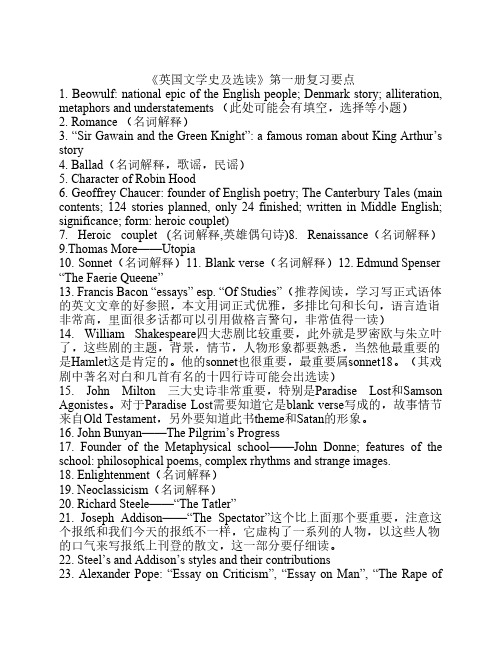
《英国文学史及选读》第一册复习要点1. Beowulf: national epic of the English people; Denmark story; alliteration, metaphors and understatements (此处可能会有填空,选择等小题)2. Romance (名词解释)3. “Sir Gawain and the Green Knight”: a famous roman about King Arthur’s story4. Ballad(名词解释,歌谣,民谣)5. Character of Robin Hood6. Geoffrey Chaucer: founder of English poetry; The Canterbury Tales (main contents; 124 stories planned, only 24 finished; written in Middle English; significance; form: heroic couplet)7. Heroic couplet (名词解释,英雄偶句诗)8. Renaissance(名词解释)9.Thomas More——Utopia10. Sonnet(名词解释)11. Blank verse(名词解释)12. Edmund Spenser “The Faerie Queene”13. Francis Bacon “essays” esp. “Of Studies”(推荐阅读,学习写正式语体的英文文章的好参照,本文用词正式优雅,多排比句和长句,语言造诣非常高,里面很多话都可以引用做格言警句,非常值得一读)14. William Shakespeare四大悲剧比较重要,此外就是罗密欧与朱立叶了,这些剧的主题,背景,情节,人物形象都要熟悉,当然他最重要的是Hamlet这是肯定的。
- 1、下载文档前请自行甄别文档内容的完整性,平台不提供额外的编辑、内容补充、找答案等附加服务。
- 2、"仅部分预览"的文档,不可在线预览部分如存在完整性等问题,可反馈申请退款(可完整预览的文档不适用该条件!)。
- 3、如文档侵犯您的权益,请联系客服反馈,我们会尽快为您处理(人工客服工作时间:9:00-18:30)。
5
1. William Wordsworth
William Wordsworth (April 7, 1770 – April 23, 1850) was an important poet of the Romantic Age in English literature.
Many people think that The Prelude,
Wordsworth went to St John's College, Cambridge in 1787.
Three years later, in 1790, he visited Revolutionary France and supported the Republican movement. The following year, he graduated from Cambridge.
In 1783 his father, who was a lawyer died.
Although many aspects of his boyhood were positive, he remembered times of loneliness and sadness. It took him many years, and much writing, to recover from the death of his parents.
In 1807, his Poems in Two Volumes were published, including "Ode: Intimations of Immortality from Recollections of Early Childhood".
Two of his children, Thomas and Catherine, died in 1812. In 1813 his family, including Dorothy, moved to Rydal Mount, Ambleside (between Grasmere and Rydal Water), where he spent the rest of his life.[1]
A
3
浪漫主义〈英文:Romanticism〉是开始于 18世纪西欧的艺术、文学及文化运动,发生 于1790年工业革命开始的前后。浪漫主义注 重以强烈的情感作为美学经验的来源,并 且开始强调如不安及惊恐等情绪,以及人 在遭遇到大自然的壮丽时所表现出的敬畏。
浪漫主义是对于启蒙时代以来的贵族和专 制政治文化的颠覆,以艺术和文学反抗对 于自然的人为理性化。
桂冠诗人(英语:)是经由政府官方任命 的诗人及其称号。
Therefore, it is like a ‘national’ poet
A poet laureate is a poet officially appointed by the government of a country. He or she is responsible for writing poems for special occasions in that country
A
13
Lord Byron is also very famous for the way he lived his life. He was a dandy, living extravagantly (浪费金钱), with many love affairs(恋爱), and debts (债). His fight against the Turks in the Greek War of Independence lead to his death from a fever in Messolonghi in Greece.
Because he was poor and there were political problems between Britain and France, he returned alone to England the next year.[1]
A
9
But he supported Annette Vallon and his daughter as best he could in later life. War between France and Britain prevented him from seeing Annette and Caroline again for several years. It is likely that Wordsworth would have been depressed during the 1790s.
A
4
浪漫主义重视民间艺术、自然以及传统, 主张一个根基于自然的知识论,以自然的 环境来解释人类的活动,包括了语言、传 统、习俗。浪漫主义受到了启蒙运动的理 念影响,也吸收了中世纪文化复古的艺术 成分。“浪漫”一词来自于“romance”—代 表了源于中世纪文学和浪漫文学里颂扬英 雄的诗赋风格。
A
In part, it was a reaction to the aristocratic (贵 族)social and political ideas of the Age of
Enlightenment and the Industrial Revolution.
A
2
It was also a reaction against turning nature into only science.[2]
A
7
Early life and education Wordsworth was born as second of five children in the
Lake District. After the death of his mother in 1778, his
father sent him to Hawkshead Grammar School.
Part VII : The Romantic Period
A
1
A. Romanticism
Romanticism is a style of art, literature and music in the late 18th and early 19th century in Europe. This movement said that feelings, imagination, nature, and old folk traditions such as legends and fairy tales were important.
an autobiographical poem of his
early years is his masterpiece.
Wordsworth was England's Poet
Laureate from 1843 until his
death in 1850.
A
6
Poet Laureate :
He was believed by some to be bisexual (双性 恋)(homosexual (同性恋)acts between males were against the law at the time) and he was believed to have been guilty of incest (逆 仑)with his half-sister. However, there is no real proof that any of that is true!!!
We can see it most strongly in arts like music, and literature. However, it also had an important influence on other areas of life.
Some of the world’s most famous writers and artists were part of this movement.
In 1802 Wordsworth and his sister, Dorothy, visited Annette and Caroline in France.[1]
A
10
In 1805 he married a childhood friend, Mary Hutchinson. Dorothy continued to live with the couple.
A
15
பைடு நூலகம்
Lady Caroline Lamb, who was his lover for a time, said that he was "mad, bad, and dangerous to know."
His life was at times pure adventure and his life
itself can be read like a great ‘romantic novel’ full of intrigue (阴谋), love, war, and almost all aspects of life, itself.
A
16
a. Don Juan
Don Juan is a satiric poem[1] by Lord Byron, based on the legend of Don Juan, which Byron reverses, portraying Juan not as a womanizer but as someone easily seduced (引诱)by women. It is a variation on the epic form. Byron himself called it an "Epic Satire" (Don Juan, c. xiv, st. 99).
